Cemeteries, waste collection, street cleaning and dog control are some of the services Northern Ireland's 11 "super councils" provide.
Just like those in the republic.
This Thursday, 462 council seats will be contested in the local government elections.
Those seeking election will have as much influence on the big constitutional and political matters as their counterparts south of the border: zero.
But you would not think that was the case.
Voters will not be electing members of the Stormont Assembly, but the results could have a bearing on whether and when the power-sharing administration returns.
As always, politics in Northern Ireland is once again largely being distilled down to a battle between orange and green, with the centre ground Alliance hoping its party colour yellow will continue to expand.
The DUP has been boycotting Stormont since February last year as part of its protest against the post Brexit trading agreement the Northern Ireland Protocol, and now its successor the Windsor Framework.
Party leader Jeffrey Donaldson says it has a mandate to do so, based on the results of the Assembly election last May, when his party won 25 seats, two behind Sinn Féin.
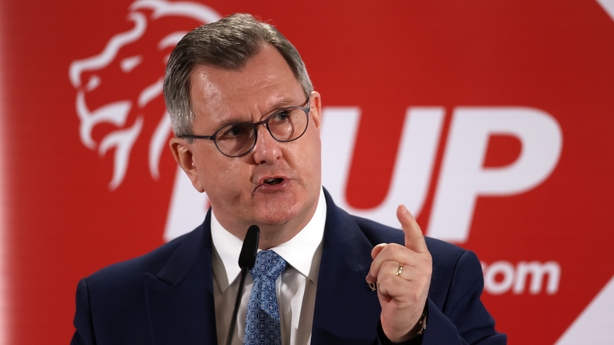
Those votes were secured on the strength of a promise not to return to devolution until the DUP's concerns about the protocol were addressed.
The party's manifesto for the council elections on Thursday is headed "Our Plan for Local Government in Northern Ireland", but the first priority is clearly identified as the future of Stormont.
The first of five election promises is a pledge to use votes cast for the party on Thursday to "seek to re-establish the NI Assembly on a fair and sustainable basis by finishing the job of fully restoring Northern Ireland's position in the UK".
That pledge is repeated in the first paragraph of the manifesto, which also adds: "We want to see the restoration of the Assembly and Executive on the basis that democratic decision making is in the hands of locally elected representatives rather than having no say over laws governing our economy and our people."
Some unionist and loyalist critics have accused the party of preparing for a climbdown.
Mr Donaldson insists its course has not changed.
"Some said after the Assembly elections that we would weaken our position," he said in his speech at the manifesto launch.
"It was a lie then and it is a lie now."
He added: "Let me be clear. We are pledged to continue to stand firm after this election until we have properly secured and protected our place within the United Kingdom."
Sinn Féin is seeking to become the largest party in local government in Northern Ireland for the first time, having emerged as the largest party at Stormont for the first time last May.
But its focus is also on Stormont and putting pressure on the DUP to end its boycott.
'Send a clear signal'
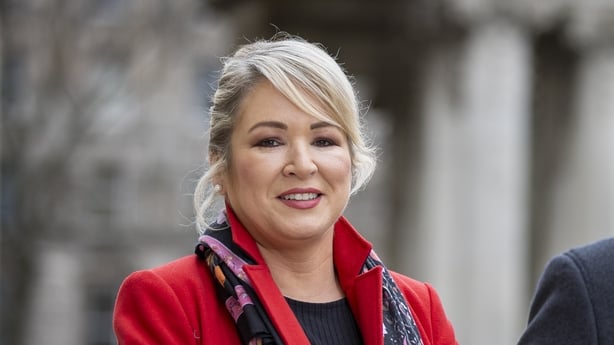
In her party's manifesto introduction, Sinn Féin's leader in Northern Ireland and Stormont's First Minister designate Michelle O'Neill states that the party has been ready to form an Executive since last May's Assembly election.
She then urged people to vote for it to "send a clear signal" to those blocking the restoration of power-sharing and "to show support for a party that is ready to get the Executive up and running".
Party President Mary Lou McDonald reinforced that message when she spoke at the manifesto launch.
"I think that one of the big messages in the course of this election campaign coming from people of all political persuasions will be 'get back to work, the time is now, there can't be further delay'".
Many within Sinn Féin believe the motivation for many within the DUP for boycotting Stormont is simply because they do not want a Catholic as First Minister and hope they can avoid that scenario by holding out until a new Assembly election is held.
Its strategists know that emerging as the largest party at local government level this week, as well as at Stormont, would send a strong signal that the next Assembly poll could deliver a result even less favourable for the DUP, and the message that a nationalist First Minister cannot be avoided.
End to 'ransom politics'
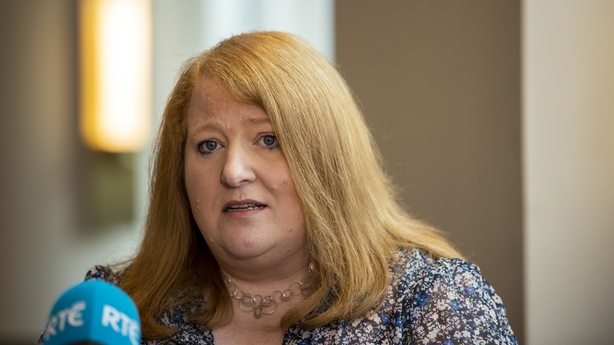
As the big unionist and nationalist political beasts battle it out for supremacy, the centre ground Alliance Party is hoping to continue its remarkable record results at council and Assembly elections.
Stormont is once again front and centre.
The message is that voters deserve a functioning government and an end to what the party has called "ransom politics".
In her foreword to the party manifesto, leader Naomi Long says voters "have an opportunity to send that message loud and clear once again: that you deserve an Executive and Assembly that works".
At his party's manifesto launch, Ulster Unionist leader Doug Beattie was keen to highlight the importance of local government, but his speech also dealt with the problems and challenges of the Northern Ireland Protocol and the Windsor Framework.
He once again said that restoring the Stormont Executive is the best way for unionists to leverage in any future negotiations with the British government. His critics argue that the best leverage is to stay out.
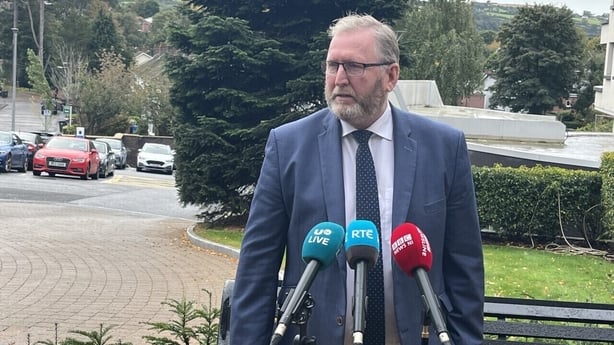
"What we cannot afford is for decisions that impact Northern Ireland to continue to be made over our heads," he said.
"That is why there's a firm belief in the Ulster Unionist Party that the Assembly and the Executive must be restored to deal with the challenges still posed by the Windsor Framework and to grasp the genuine opportunities."
The SDLP shares that view and its manifesto makes a pledge to "continue to fight for the restoration of the Assembly and Executive".
Party leader Colum Eastwood is one of those who believes the DUP will be back in power-sharing, and sooner rather than later, partly because a long-term absence of devolution would fuel debate about an alternative, including a United Ireland.
"I think he will eventually go back and I think Michelle O’Neill will be First Minister," he said at his party’s manifesto launch on Friday.
"I think that's inevitable, because the DUP are bound to realise that it is not in the interests of unionism to starve people of good government, or any government at all, It is not in the interests of unionism to have many, many people thinking ….. about Plan B."
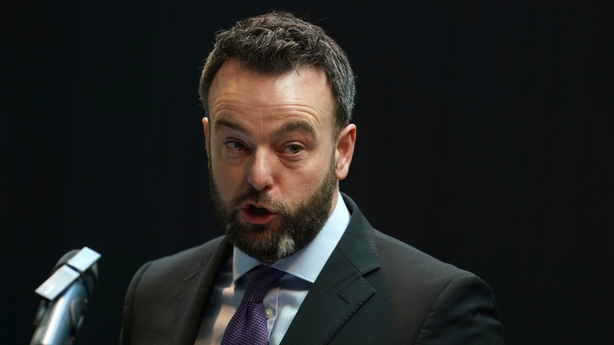
In the last council elections, the DUP won 122 seats, 17 ahead of Sinn Féin.
The party will be nervous about the possibility of being eclipsed by Sinn Féin, but will also be keeping a very close eye on the Traditional Unionist Voice, the more hardline party led by former senior DUP member Jim Allister.
Last time around the TUV won six council seats and is hoping to significantly increase that number by highlighting concerns about Northern Ireland’s constitutional future within the UK.
A large-scale loss of DUP votes and seats to the TUV would make it more difficult for Mr Donaldson to go back into power-sharing, as many within his party would fear similar losses in any future Assembly election.
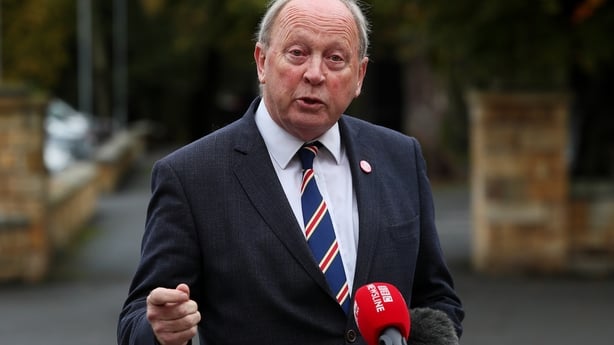
DUP strategists will also keep a close eye on the performance of the Alliance Party as any haemorrhaging of DUP votes to the centre ground could signal that some within its base are growing tired of the protocol debate.
There have been signs in recent weeks that the DUP may be preparing for a change of course.
A number of senior party figures have said the British government must provide a substantial financial package to help any future Stormont Executive deal with the crisis in public services, particularly health.
Several senior figures have also conceded privately that the absence of devolution could undermine Northern Ireland’s position within the UK and fuel debate about a different constitutional framework.
The DUP manifesto states that the party is seeking the "right outcome that respects Northern Ireland's place in the Union for the long-term".
Not if, but when
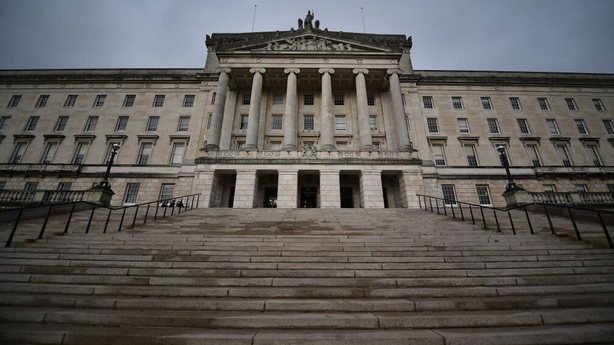
In the margins of the DUP manifesto launch, I spoke to several well-placed sources who all spoke in terms of when a power-sharing administration would be restored, not if.
But what if that does not happen? What if devolution is put into long-term or even terminal cold storage?
I asked one senior source.
"The problem is I don't think there's anywhere else to go," was the reply.
During his speech at a conference at Queen's University in Belfast last month to make the 25th anniversary of the Good Friday Agreement, former US President Bill Clinton urged politicians to end the political stalemate by telling his audience that some things are more important than the results of the next election.
"I bet he didn’t say that when he was running for office," was the response from one experienced Stormont political advisor.
That is probably the one thing the parties would agree on this week.







